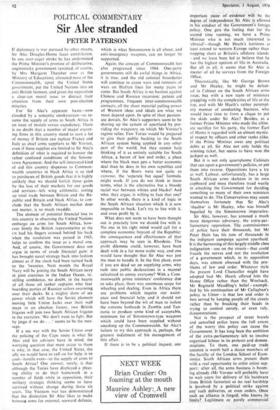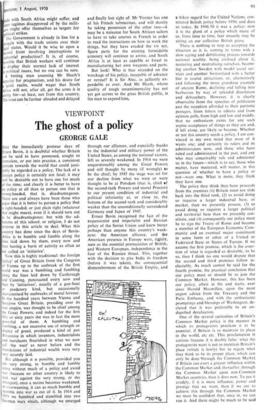POLITICAL COMMENTARY
Sir Alec stranded
PETER PATERSON
If diplomacy is war pursued by other means, Sir Alec Douglas-Home faces annihilation. In one over-eager stroke he has undermined the Prime Minister's promise of deliberative, ungimmicky government (assisted, of course, by Mrs Margaret Thatcher over at the Ministry of Education), alienated most of the Commonwealth, upset the United States government, put the United Nations into an anti-British ferment, and given the opposition a clear-cut moral issue to distract their attention from their own post-election miseries.
For Sir Alec's apparent haste—now clouded by a semantic smokescreen—to re-
sume the supply of arms to South Africa is an issue of morals versus expediency. There is no doubt that a number of major export- ing firms in this country stand to earn a lot of money if Britain can replace France and Italy as chief arms suppliers to Mr Vorster, even if these supplies are limited to Sir Alec's definition of what is required to honour the rather confused conditions of the Simons- town Agreement. And the self-interested kind of aid this country dispenses to Common- wealth countries in black Africa is so tied to purchases of British goods that it is highly unlikely that we should forfeit those gains by the loss of their markets for our goods and services—left wing arithmetic, totting up total trade between Britain and the Re- public and Britain and black Africa, to con- clude that the South African market does not matter, is so much twaddle.
The element of potential financial loss to this country in observing the United Nations embargo on arms for South Africa, how-
ever firmly the British representative at the UN had his fingers crossed behind his back
when the resolution was passed in 1963, helps to confirm the issue as a moral one. And, of course, the Government does not argue in terms of crude financial gain: it has brought naval strategy back into fashion almost as if the clock had been turned back to the 'twenties. Next month the Royal Navy will be joining the South African navy in joint exercises in the Indian Ocean, in- stilling confidence, no doubt, in the hearts of all those oil tanker captains who fear boarding parties of Russian sailors swarming over their decks. In a mighty show of sea power which will have the Soviet planners moving little Union Jacks over their wall maps in an absolute frenzy, two British frigates will join two South African frigates in the exercises. 'We don't want to fight, But by jingo if we do . . .' seems to be the mes- sage.
If a sea war with the Soviet Union over the policing of the Cape route is what Sir Alec and his advisers have in mind, the worrying question that must occur to them is why, in that case, the United States, the ally we would have to call on for help, is so cool—hostile even—to the supply of arms to South Africa? One answer, surely, is that although the Tories have displayed a pleas- ing ability to do their homework in a number of fields while in opposition, their military strategic thinking seems to have survived without change during those six years. The Vietnam war has demonstrated that the distinction Sir Alec likes to make between arms for external, seaward defence, which is what Simonstown is all about, and anti-insurgency weapons, can no longer be supported.
Again, the concept of Commonwealth has also progressed since 1964. One-party governments still do awful things in Africa, it is true, and the old colonial boundaries will continue to cause wars and rumours of wars on Biafran lines for many years to come. But South Africa is no bastion against Chinese and Russian incursion: patient aid
programmes, frequent inter-commonwealth contacts, all the sheer material pulling-power of Western ideas and ideals are what we must depend upon. In spite of their passion- ate denials, Sir Alec's supporters seem to be shoring up the system of apartheid by pro- viding the weaponry on which Mr Vorster's regime relies. Few Tories would be prepared to give their public backing to the South African system being applied in any other part of the world, but they cannot help thinking of it as entirely suitable for South Africa, a haven of law and order, a place where the black man gets a better economic deal than he does in his own republics and where, if the Boers were not quite so extreme, the `separate but equal' formula might work. If you do not think in these terms, what is the alternative but a bloody racial war between whites and blacks? And who, they argue, is willing to face that one? In other words, there is a kind of logic in the South African situation which it is now impossible to buck. Let's try to live with it, and even profit by it.
What does not seem to have been thought out is precisely how we should live with it. No one in his right mind would call for a complete economic boycott of the Republic: the consequences and effectiveness of that approach may be seen in Rhodesia. The profit dilemma could, however, have been dealt with in a far more svelte way, and one would have thought that Sir Alec was just the man to handle it. In the first place, even if you are dead set on supplying arms, why rush into public declarations in a manner calculated to annoy everyone? With a Com- monwealth prime ministers' conference due to take place, there was enormous scope for wheeling and dealing. Even in Africa there are problems which require our assist- ance and financial help, and it should not have been beyond the wit of man to isolate the extreme hotheads in Zambia and Tan- zania to produce some kind of acceptable, minimum list of Simonstown-type weapons which could have been supplied without smashing up the Commonwealth. Sir Alec's failure to try this approach is, perhaps, the greatest indictment of his management of this affair.
If there is to be a political inquest, one important piece of evidence will be the degree of independence Sir Alec is allowed in his conduct of the Government's foreign policy. One gets 'the feeling that for the second time running, we have a Prime
Minister who is not much interested in -abroad'—though Mr Heath's horizons at least extend to western Europe rather than stopping short at Britain's offshore islands
- and we have been led to believe that he has the highest opinion of life in Australia.
But all in all, it seems that Sir Alec is master of all he surveys from the Foreign Office.
Theoretically, like Mr George Brown and Mr Healey, he might be defeat- ed in Cabinet on the South African arms issue, but with a new team of ministers grappling with the complexities of life at the top, and with Mr Heath's rather perempt- ory manner of conducting business, who would have time to form a clique to put the skids under Sir Alec? Besides, as a former Prime Minister who made the ultim- ate sacrifice for his party, the former Earl of Home is regarded with an almost mystic. al respect by officers and other ranks alike. If the Prime Minister owes any political debts at all, Sir Alec not only holds the winning ticket, but seems to have won the jackpot as well.
But it is not only quarrelsome Cabinets that can upset a government's policies, or put them into reverse. Oppositions have a try as well. Labour, unfortunately, has a large South African arms skeleton in its own cupboard and must therefore tread warily in attacking the Government for deciding something so many of their own ministers wanted to do. The Conservatives may count themselves fortunate that Sir Alec's `shadow' is Mr Healey, who was himself beguiled by the Simonstown imperative.
Sir Alec, however, has aroused a much more dangerous adversary, the extra-par- liamentary opposition. The commissioners of police have their thousands, but Mr Peter Hain has his tens of thousands in the indignant campaign against apartheid. It is the harnessing of this largely middle class indignation - out on the streets - that could frazzle the nerves and test the resolution of a government which, in its opposition days, was almost obsessed with the pro- blems of law and order. Whatever style the present Lord Chancellor might have adopted had Mr. Heath offered him the Home Office rather than the Woolsack, Mr Reginald Maudling's belief - exempli- fied by his continuation of Mr Callaghan's policy in Ulster-is that law and order is best served by keeping people off the streets rather than by breaking their heads in trying to control unruly, or even ruly, demonstrations.
Nor is the prospect of street brawls and cancelled police leave the full extent of the worry this policy can cause the Government. It has long been the ambition of the extra-parliamentary left to involve organised labour in its protests and demon- strations. To them, one paid-up trade unionist is worth half a dozen members of the faculty of the London School of Econ- omics. South African arms present them with a real opportunity to enlist union sup- port: after all, the arms business is boom- ing already (Mr Vorster will probably have to wait years for delivery of his hardware from British factories) so no real hardship is involved by a political strike against any such deliveries, or even orders. Once such an alliance is forged, who knows its limits? Legitimate or purely commercial
:lde with South Africa might suffer, and ,ner regimes disapproved of by the milk., is might offer themselves as targets for -olitical strikes.
The Government is already in line for a -uggle with the trade unions over their
status. Would it be wise to open a ,,ond front involving interruptions to -Justrial production?, It is, of course, possible that British workers will continue to display their normal lack of interest Jo political issues, but no one can be sure. A betting man assessing Mr Heath's pacity for pragmatism, and his desire for quiet realm, would wager that South frica will not, after all, get the arms it is sking for—at least, not from this country.
The issue can be further clouded and delayed
and finally lost sight of. Mr Vorster has one of his French submarines, and will shortly be taking possession of the other two—it may be a nuisance for South African sailors to have to take courses in French in order to read the instructions on how to work the things, but they have evaded the UN net. Spare parts for the existing formidable armoury will continue to arrive, and South Africa is at least as capable as Israel in manufacturing her own weapons and parts.
But look! Who is that stranded on the wreckage of his policy, incapable of advance or retreat? It is Sir Alec, as gallantly ex- pendable as ever. And Mr Heath, whose quality of tough unsentimentality has not yet got across to the great British public, is the man to expend him,































 Previous page
Previous page